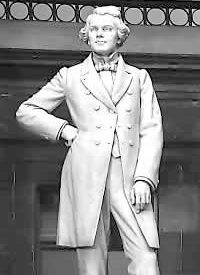
Gorrie was born 208 years ago today on an island in the Caribbean and grew up in South Carolina. He went on to earn a medical degree in New York. But it was on the Gulf Coast of Florida where he settled in 1833 that his medical research evolved into a life-long quest to combat the effects of temperature and climate on disease. He saw his patients at the U.S. Marine hospital in Apalachicola suffering from malaria and yellow fever. Popular thought at the time attributed such tropical diseases to bad air. (The word malaria means "bad air disease.")
He set up a primitive cooling system in the sickroom with ice-filled basins suspended from the ceiling. When his supply of ice was interrupted by regional trade disputes, he concocted the first patented ice-making machine in history. Gorrie also had the foresight to drain area swamps and use mosquito netting in the hospital long before the protozoan source of malaria was discovered.
This visionary also realized the benefits of improvements to his "mechanical condensation" machine. In her book Air Conditioning America, Gail Cooper quoted him predicting that "the cheap and abundant production of artificial cold would enable many industrial arts to be carried on advantageously in warm climates, or continuously in temperate regions." So devoted was he to the idea of using cooling systems to stimulate industry and economy that he gave up his medical practice in 1845 to dedicate all his resources and energy to it. He died only 10 years later, financially ruined and publicly humiliated by the failure of his ventures.
But Gorrie's vision took wings in 1872 when the King Ranch in Texas installed an improved ice-making device, and it exploded several decades later when Edison's contributions in harnessing electricity combined with the talents of yet another air conditioning pioneer, Willis Carrier. The latter perfected a way to contain humidity in climate-control systems. The 20th century saw such a rapid maturity of refrigeration and air conditioning that most people today cannot imagine a world without them and take them largely for granted.
Writing for American Heritage magazine, Robert Friedman tells the story of how these inventions transformed our world and culture in his article, "The Air-conditioned Century: The story of how a blast of cool, dry air changed America." Friedman credits climate control with "the modernization of industry and the rationalization of production … the rise of a consumer society … the advent of the skyscraper … the growth of the Sun Belt, and the development of suburbia."
Friedman recounts advancements in medicine, transportation, food preservation, industrial productivity, and improved hygienic conditions in homes and businesses, not to mention basic human comfort. He points out that before the days of air conditioning, many areas virtually shut down during summer months; Great Britain officially classified Washington D.C. as a sub-tropical climate.
To really bring home the importance of mechanical cooling, consider the case of Peter Van Buren, a veteran State Department employee assigned to Baghdad in 2009 as part of the U.S. Provincial Reconstruction Team. He tells the story of his experience in his new book, We Meant Well: How I Helped Lose the Battle for the Hearts and Minds of the Iraqi People — the title indicates the waste and corruption he witnessed during his time there. One of the stories he recounted on NPR's Fresh Air program involved a $2 million chicken-processing plant U.S. taxpayers funded that ended up being nothing more than a publicity stunt. It made great headlines in the media but couldn't process chickens because of the lack of an infrastructure for refrigerated storage of the product.
Air conditioning and refrigeration have made our industrialized first-world society possible. As long as Americans do not allow Washington bureaucrats to regulate them away, we will enjoy the benefits for years to come. The father of these developments certainly deserves a birthday salute, as that in the 1912 poem by George Graham Currie entitled simply, "In Honor of Dr. John Gorrie."
Give him a niche in the temple of Fame
Give him his place and enhallow his name!
He, who in love for his suffering kind,
Lent them the use of his wonderful mind:
Pointed the way by unheard of device
To make in the Tropics the purest of Ice.
Give him a niche! May his name never die!
Build him a monument stately and high;
Who, in the ages, has equaled his thought?
Who for his fellows such solace has brought?
Think of the troubles his skill has allayed!
Think of the inroads on pain he has made.
Give him a niche and enshrine it with flowers!
Honor the man with divinity’s powers!
He who, no matter how sultry the day,
Drove from damp foreheads the fever away:
Pay quick a tribute that nobody shuns,
To GORRIE — greatest of Florida’s sons.




